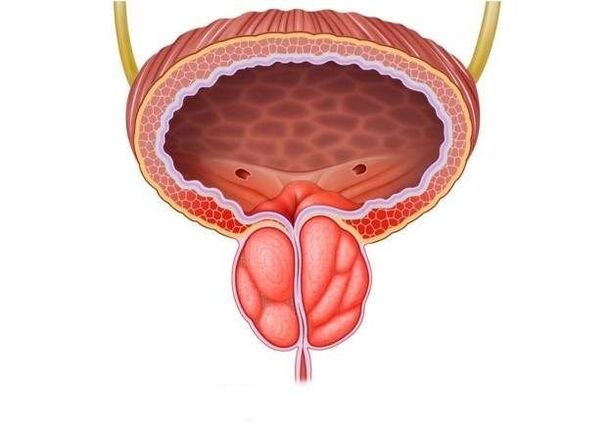
Prostatitis today is the leading disease in the group of men's diseases mainly transmitted through sexual contact. Its complications threaten infertility, decreased sexual desire and impotence.
Symptoms of prostatitis are not only pain, urinary disorders and inflammation of the spermatic cord. The most dangerous consequence of severe inflammation may be degenerative prostate cancer. Meanwhile, a timely diagnosed pathological process can be easily stopped.
Causes of inflammation
The risk of developing prostatitis increases due to various factors that lead to the disease:
- One-time hypothermia or related to outdoor work.
- A sedentary lifestyle leads to disruption of the digestive system.
- Chronic somatic diseases (diabetes mellitus, hypertension).
- Localized and peri-localized foci of infection (rhinitis, tonsillitis, stomatitis, gastritis).
- Persistent UGI (chlamydia, trichomonas, herpes virus).
- Stress, insomnia, chronic fatigue syndrome.
- Reduced immunity due to illness, surgery, mental stress.
- Bad habits lead to intoxication: alcohol, smoking, strong coffee.
- Occupational injuries to the perineum of car drivers, athletes, and workers in hazardous occupations.
- Promiscuous sex life, interrupted sexual intercourse, sexual intercourse without pleasure and incomplete ejaculation, prolonged lack of intercourse (low sperm demand leading to glandular stagnation).
- Venereal diseases.
Despite the fairly large number of provocative moments, the essence of prostatitis is the appearance of stagnation inside the organ due to impaired blood circulation and lymph flow.
Symptoms of prostatitis
Prostatitis can be suspected based on the following disorders in the functioning of the genitourinary system:
- discomfort when urinating, uncontrolled urination;
- dysfunction, weak erection, decreased sexual desire;
- difficulty urinating, feeling of incomplete bladder emptying;
- pain in the perineum when sitting for long periods, such as when driving;
- dry.
The acute phase of the disease causes significant discomfort. This stage is accompanied by the following symptoms:
- frequent painful urination;
- delay or inability to urinate;
- sharp pain in the perineum, transmitted to the anus and enhanced when defecating. The result is difficulty defecating;
- General intoxication of the body, feverish state.
The chronic form of prostatitis is accompanied by other symptoms:
- slight increase in body temperature;
- constant fatigue;
- mild pain in the perineum, burning in the urethra;
- discomfort during urination and defecation;
- weaken sexual function and lead to psychological depression.
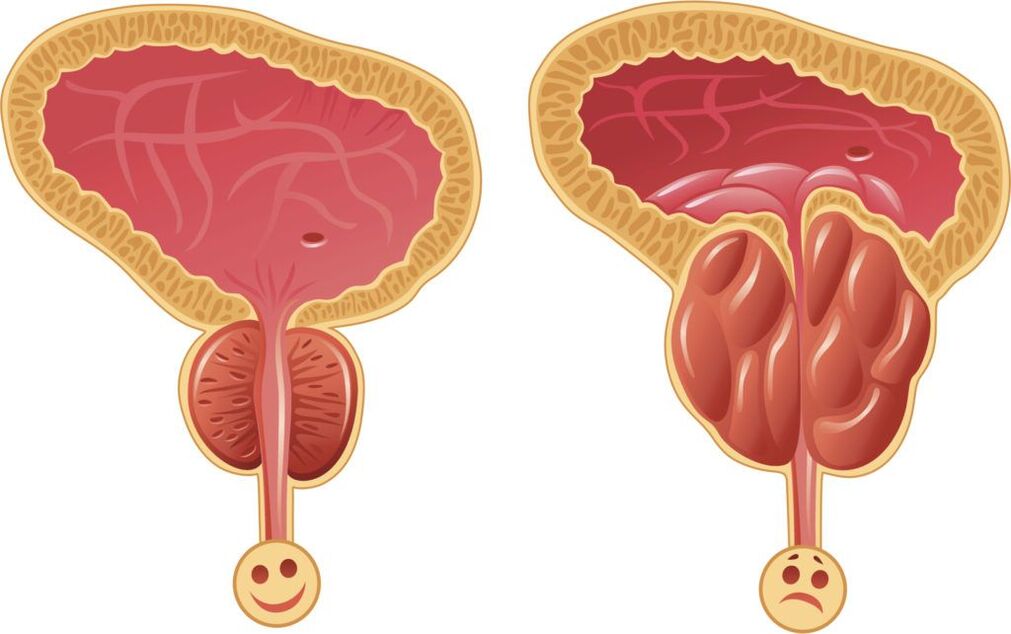
Classify
In modern urology there is no unified classification of diseases. However, practicing physicians prefer this option for classifying the inflammatory process in the prostate.
According to the progression of the disease:
- Acute prostatitis. It accounts for more than 50% of cases in people no older than 30-35 years old.
- Chronic options. It is considered an ageless genre. It does not manifest itself for a long time, the driving force for its development is a cold or infection.
Because of the cause of the disease:
- Bacterial prostatitis, which prevails in men under 40 years old, occurs against the background of ultrasound and does not extend beyond the boundaries of the organ.
- Non-bacterial pathological changes in the gland, mainly chronic.
- Viral prostatitis is characterized by an acute course affecting the entire genital area.
According to the nature of structural changes in the prostate:
- Fibrous prostatitis is characterized by rapid growth of the gland and requires radical intervention. Clinically similar to prostate adenoma.
- Calculating prostatitis occurs due to the formation of stones inside the prostate. Considered a harbinger of cancer.
- Congestive prostatitis, a result of a sedentary lifestyle, is diagnosed in every second patient.
Signs of disease
If a man discovers at least two of the following symptoms of prostatitis, he should immediately contact a qualified specialist:
- Urinary disorders with intermittent urine, weak and abnormally short urine stream, causing urine splashing, difficulty and pain before urinating. The frequent urge to empty the bladder occurs mainly at night.
- Pain is localized in the lower abdomen, spreading to the scrotum, perineum and rectum.
- Sexual dysfunction.
- Problems with ejaculation, changes in sperm (concentration, quantity).
Acute prostatitis
The disease begins with a sharp increase in temperature (up to 40 degrees), headache and fever. Symptoms appear with pain in the groin, perineum, back, discharge from the urethra, frequent urination and constant urge to urinate.
Bladder emptying occurs slowly and there is a burning sensation. Urine becomes cloudy and may contain blood. Irritability and fatigue occur.
The outcome of acute prostatitis can be a complete resolution of the process (if treatment is started promptly). Since changes occur in many pelvic organs, they cannot be left to chance, otherwise corresponding complications will arise:
- Seminal vesiculitis is an inflammation of the seminal vesicles, causing pus to appear in sperm, not only reducing semen quality but also leading to loss of reproductive function.
- Cholecystitis - inflammatory changes in the spermatic tube become the cause of severe pain during sexual intercourse, disruption of orgasm and psychological impotence.
- The formation of abscesses in the body of the prostate, rupture and purulent lesions in the rectum lead to exacerbation of symptoms, severe poisoning of the body, and even death.
- Stagnation in the tissues of the prostate leads to changes in their structure, disruption of nerve distribution, blood supply to both the gland and organs located nearby, disrupting function. of them. Erection becomes insufficient for full sexual intercourse, premature ejaculation and prolonged sexual intercourse without orgasm.
- Scarring changes in the gland and spermatic cord lead to infertility, reduced sperm quality and sperm motility. Narrowing of the urethra prevents normal urination; Bladder obstruction can cause acute urinary retention, requiring urgent surgical care.
Chronic prostatitis
The main feature of the disease is the vagueness of clinical symptoms with a long and persistent course. Most often, the chronic form occurs independently, as a main pathology against the background of stagnation of blood in the vessels (prostate), bacterial prostatitis.
The main symptoms of chronic prostatitis are:
- fever;
- pain occurs in the scrotum, perineum, anus, back;
- urinary disorders;
- mucus or pus discharge from the rectum or urethra, even without urinating or defecating;
- erectile dysfunction, painful ejaculation, interrupted sexual intercourse, prolonged intercourse without feeling satisfied.
Inaction and improper treatment of chronic prostatitis can cause complications:
- Infertility results from chronic inflammation of the spermatic cord, seminal vesicles, testicles, and their appendages.
- Cystitis, pyelonephritis (other diseases of the genitourinary system) are a consequence of hematogenous and mechanical spread of bacteria.
- Sepsis.
- Continuously reduced immunity.
- Untreated prostatitis can cause cancer in 35–40% of cases.
Diagnose
The clinical picture of the disease is typical so diagnosis is not difficult. It is performed by a urologist based on the patient's medical history, medical examination, minimal tests using the most modern medical equipment:
- Rectal examination, taking secretions for testing (fluid culture determines sensitivity to antibiotics).
- UAC, UAM, urine bacterial culture.
- STD smear test, UGI test.
- Monitor daily urination rhythm, measure urination rate (uroflowmetry).
- For differential diagnosis, ultrasound or TRUS is performed.
- If cancer needs to be ruled out, a biopsy will be performed, an X-ray of the urinary tract will be taken, and PSA - prostate-specific antigen - will be determined.
- To diagnose infertility, a spermogram - an ejaculation analysis - is prescribed to determine male fertility.
Based on the results of the patient's examination, an individual plan for the treatment of complicated prostatitis will be drawn up. When prescribing the drug, the form of pathology and the presence of accompanying diseases will be taken into account. The decision about where therapy is performed (inpatient or outpatient) is made by the doctor. Treatment is performed with careful monitoring of laboratory results.
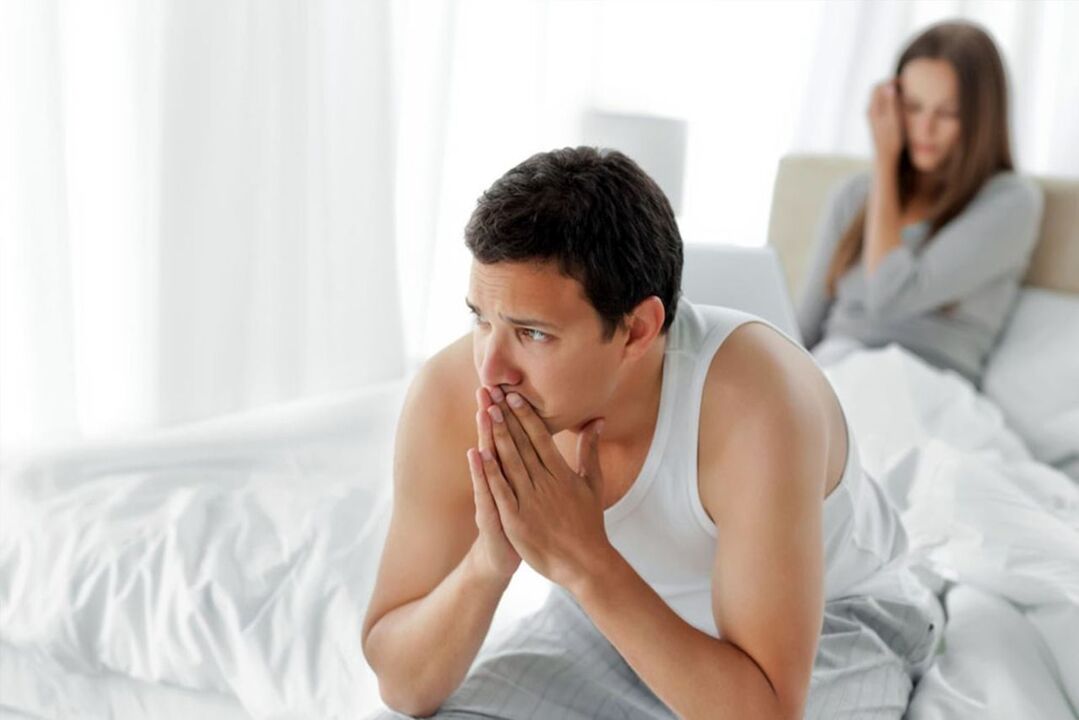
Treatment of acute prostatitis
Acute prostatitis requires bed rest, a special, salt-free diet, and sexual rest.
Course treatments:
- The most effective treatment for prostatitis is etiotropic therapy. If the cause of prostatitis is infection, then the use of antibacterial drugs is the top priority, which helps reduce inflammatory manifestations.
- Pain syndrome is alleviated by analgesics, antispasmodics, rectal suppositories, microenemas with warm analgesic solutions. NSAIDs may be used.
- Immunostimulants, immunomodulators, enzymes, vitamin complexes and combinations of trace elements have proven their effectiveness.
- Physiotherapy can only be performed in the subacute stage of the disease. They improve microcirculation and increase immunity: UHF, microwave, electrophoresis, laser, magnetic therapy.
- Massage is another effective method of affecting the prostate. It opens the ducts, normalizing blood circulation in the scrotum and pelvis.
- Acute hydronephrosis can be corrected with urinary catheterization and trocar cystostomy.
- The purulent process involves surgical intervention.
- Consulting by a psychologist.
Treatment of acute prostatitis is complex.
Effective treatment of acute prostatitis in men includes drugs from different pharmacological groups:
- Antibiotics.Drugs with a wide spectrum of action are used, which have a bactericidal effect against most pathogens. Usually, antibiotic treatment is a therapeutic measure, since in most cases the cause of prostatitis is pathogenic bacteria. For bacterial infections, antibiotics are prescribed, for viral infections, antiviral drugs are prescribed, and if protozoa are detected, anti-trichomonas drugs are prescribed. The choice of antibiotics is made empirically or based on the results of PCR, bacterioscopy and bacterial culture. The choice of antimicrobial agents, determination of dosage, frequency and duration of administration can be carried out exclusively by the attending physician. Along with antibiotics, urethral drugs can be prescribed that have an antiseptic effect on the mucous membrane of the genital tract.
- Anti-inflammatory drugs.Allows you to reduce the severity of swelling in tissues and the intensity of pain. As a rule, nonsteroidal anti-inflammatory drugs (NSAIDs) are used for this.
- Vascular medicine– Reduces tissue swelling, eliminates congestion in the prostate, thereby reducing pain, improving blood circulation and local metabolism in the tissue.
- Enzyme- Thins the prostate and promotes pus drainage. In addition, enzyme drugs increase the effectiveness of antibacterial treatment by improving the absorption of their active ingredients by affected tissues.
- Diuretics (diuretics).They increase urine output, helping to mechanically "wash away" the infection.
- While taking antibiotics, the patient is prescribed hepatoprotective drugs to protect the liver parenchyma from toxic damage and improve its functional state.
- To eliminate and prevent the development of intestinal dysbiosis during antibiotic treatment, patients are prescribed probiotics.
- After the acute inflammation in the prostate subsides, the patient is prescribed a course of physiotherapy treatment - drug electrophoresis, galvanization, magnetism, laser, mud therapy, etc. v. Such procedures improve local microcirculation and lymphatic drainage, metabolic processes and tissue nutrition, stimulate tissue repair, accelerate the final resolution of the inflammatory process, promote recovery. tissue regeneration and normalization of the functional state of the prostate.
Joint activities must be performed.
A diet for acute prostatitis in men is prescribed, which includes providing a sufficient amount of easily digestible proteins and vitamins.
During periods of worsening inflammation, spicy, fried, fatty, salty foods and sauces are eliminated from the diet.
Elimination of alcohol, cessation of smoking, abstinence from sex and intense physical activity, including sports, are recommended.
It is necessary to normalize sleep, work and rest, balance the emotional background.
During illness, a person needs functional rest.
With timely and accurate diagnosis and treatment of acute prostatitis in a medical facility, the prognosis will be favorable - there will be a full recovery.
If acute prostatitis develops, consult a doctor immediately and do not self-treat!
Treatment of chronic prostatitis
With long-term effects (at least a month) on the prostate, there is no guarantee of 100% cure. Prioritize herbal medicines, regulate immunity, and change family habits:
- Herbal preparations are widely used in urological practice. They can accumulate at the site of the most active pathological process, protect cells from oxidation, remove free radicals and prevent the growth of glandular tissue.
- Antibacterial therapy is selected individually, based on the sensitivity of bacteria to the drug.
- Immunity enhancing drugs not only help to cope with prostatitis, but also correct the negative effects of antibiotics that disrupt the function of the immune system.
- Pain syndrome is alleviated using alpha blockers and muscle relaxants.
- Prostate massage allows you to mechanically remove "excess" secretions of the gland through the urethra, improving blood circulation and minimizing congestion.
- Physical therapy: laser, magnet, ultrasound, iontophoresis, warm water bath or microbiome with herbs.
- In severe cases, intravenous fluids with diuretics are indicated. This stimulates abundant urine production, prevents symptoms of intoxication, the development of ascending cystitis and pyelonephritis.
- For constipation, herbal laxatives are used.
- The urologist and psychologist, together with the patient, develop a long-term program for each individual regarding daily routine, necessary rest, diet, physical activity according to dosage and activity. sexual activity.
- If the chronic process cannot be treated and the urine flow is blocked, surgical intervention is indicated: removal of all affected tissue (transurethral prostatectomy) or complete removal of the glandwith surrounding tissues (prostatectomy). Practiced in special cases, it causes impotence and urinary incontinence. Young people do not have surgery because it can cause infertility.
Treatment with medication
Treatment of prostatitis with antibacterial therapy must begin with bacterial culture, the purpose of which is to assess the sensitivity of the body to this antibiotic. If urination is impaired, the use of anti-inflammatory drugs will bring good results.
The drug is administered in tablet form, in acute cases - in the form of drops or intramuscular injections. Rectal suppositories are effective in the treatment of chronic forms of prostatitis: with their help, the drug reaches its goal faster and has minimal effect on other organs.
Blood thinners and anti-inflammatories have also been shown to be effective.
Antibacterial therapy
Antibiotics are an effective remedy in the fight against bacterial prostatitis. To achieve the desired effect and not harm the body, the choice of medication, dosage and treatment regimen must be made by a doctor. To correctly select the most effective drugs, he will have to find out which pathogen causes prostatitis, and also check the tolerance of a particular group of patients to antibiotics.
Antibiotics in the fluoroquinolone group have been shown to be effective in treating chronic prostatitis. Their action is aimed at preventing bacterial infection and strengthening the body's immunity. In addition, the bacteriostatic antibiotic trimethoprim is recommended for the prevention and treatment of concomitant diseases of the genitourinary system.
In addition, the treatment of prostatitis caused by mycoplasma and chlamydia can be carried out with drugs from the macrolide and tetracycline groups, which help slow down the spread of infection.
The duration of antibacterial use is from 2 to 4 weeks. In case of positive motivation, the course can be extended.
Physical therapy
Physiotherapeutic techniques in the treatment of prostatitis are aimed at activating blood circulation in the pelvic area, improving metabolic processes in the prostate and cleaning the ducts. If physical therapy is combined with antibiotics, the effects of the latter will be enhanced.
Main methods include:
- magnetic therapy;
- laser therapy;
- electrophoresis;
- heat up;
- supersonic;
- mud therapy;
- high frequency irradiation;
- physical therapy.
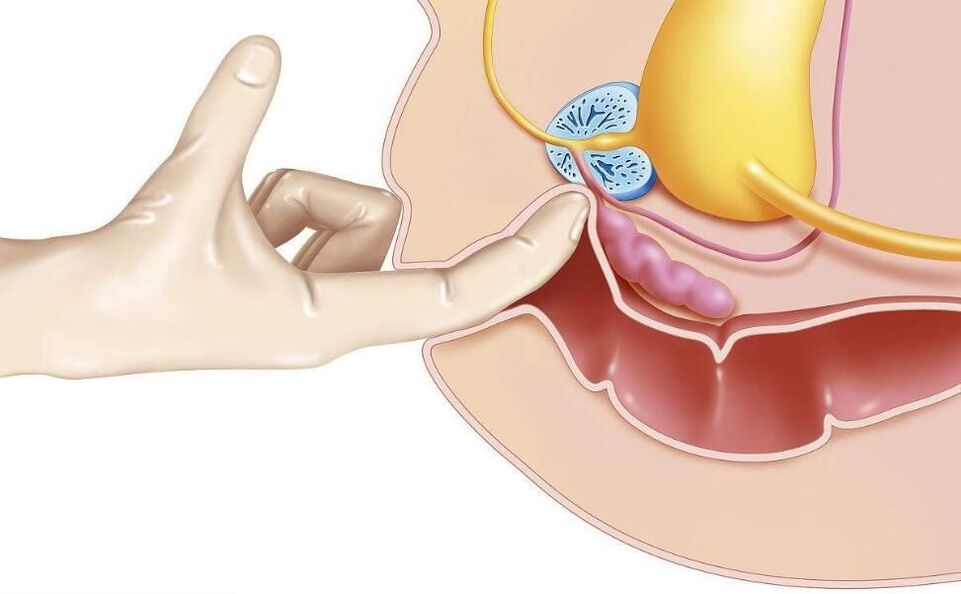
One of the oldest methods, transrectal prostate massage, according to modern research, has no proven effectiveness.
Treatment is non-specific
Treatments for nonspecific prostatitis include:
- hirudotherapy;
- therapeutic fasting;
- Acupuncture;
- diet according to the Ostrovsky method;
- Alkalize the body using the Neumyvakin method.
We strongly recommend that you discuss all non-traditional prostatitis treatments with your doctor.
Surgery
Surgical methods are used in complex and emergency cases:
- for drainage of purulent abscesses, which are removed endoscopically through punctures;
- in case of difficulty urinating due to damage to the urinary tract;
- with a large volume of affected area;
- with a significant number of stones in the body of the gland.
Stones and hardened tissue are removed endoscopically. In cases where the affected area is large or has many stones, prostatectomy is used.
Transurethral resection is also effective for bacterial prostatitis. In this way, the risk of recurrence can be reduced.
Folk remedies
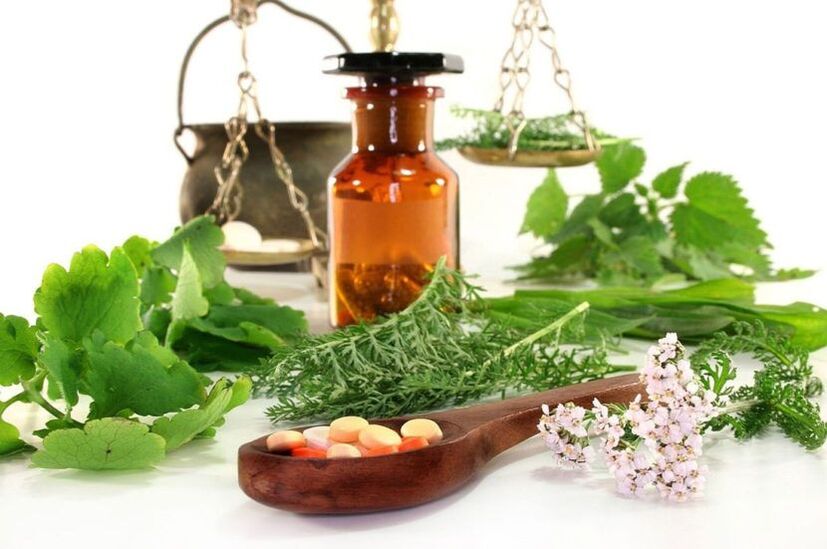
Treatment of prostatitis with folk remedies is unlikely to be effective on its own, but can be applied in combination with medication and physical therapy methods. These include: beekeeping products, decoctions of herbs and seeds, garlic tincture, ginger, beaver, fresh vegetables, pumpkin seeds.
In cases of acute illness, you must consult a doctor and in no case should you self-medicate! If the abscess ruptures, death can occur.
Suppositories for prostatitis
Treating prostatitis with rectal suppositories is much more effective than pills, if only because the rectum is much closer to the prostate, which means the medication will work faster.
The composition of drugs for prostatitis can be completely different, they are prescribed to solve a specific problem.
- The antibacterial agent is especially effective for prostatitis caused by chlamydia.
- Painkillers are used to treat symptoms, they relieve pain very well.
- Immune stimulant improves blood circulation, reduces swelling and is used in complex therapy.
- Herbal medicine has mild effects. They, like candles on bee products, are used as an addition to the main treatment.
- Preparations based on Ichthyol promote blood flow in the intestinal mucosa, help accelerate the deterioration of inflammatory processes and slightly improve immunity.
- The product is based on special enzymes that prevent the formation of scar tissue. It is recommended to take it as part of complex therapy with antibiotics, anti-inflammatory drugs and analgesics.
Auxiliary drugs
To treat symptoms of prostatitis in men, such as pain relief when urinating, you can additionally take antispasmodic drugs, which relax smooth muscles and thus quickly relieve pain.
Overall health is enhanced by blood thinning and anti-inflammatory dietary supplements based on bee products, pumpkin oil and palm fruit extract.
Diet and lifestyle
To treat prostatitis, a balanced, reasonable diet and healthy lifestyle are very important. Food should not contain spicy, fried, salty or pickled foods. In acute cases, alcohol is strictly prohibited.
Foods should contain enough fiber to prevent constipation. Protein content should be reduced. You should add herbs, ginger, and pumpkin seeds to your diet.
Consequences of untreated prostatitis
Even if prostatitis symptoms do not appear for a long time, it is still necessary to be examined regularly by a urologist. Prostatitis that is not completely cured may be accompanied by the formation of calcifications, which will then have to be removed along with the gland. Experts are confident that there is no other way to remove or dissolve the stone.
In addition, pathogenic microorganisms can move to nearby organs, causing inflammation. Progressive prostatitis can cause the development of adenomas and prostate cancer.
Prevent
To prevent the appearance of a disease that causes discomfort in men, you need to eliminate provoking factors and follow simple rules:
- Have a healthy lifestyle, give up bad habits.
- Don't be too cold.
- Drink at least 1. 5-2 liters of water per day.
- Strengthen your immune system, walk a lot, stay flexible.
- Participate in sports, visit fitness clubs.
- Avoid stressful situations.
- Practice a regular sex life with a regular partner.

























